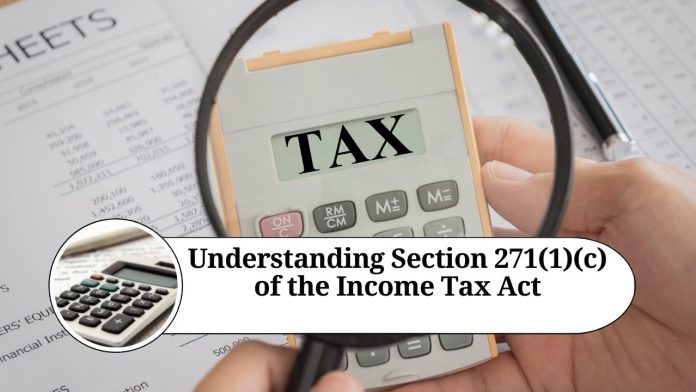Headline: Understanding Section 271(1)(c) of the Income Tax Act
The Indian Income Tax Act of 1961 has several sections that govern taxation laws in India. One such section is Section 271(1)(c), which deals with the imposition of penalty for concealment of income or furnishing of inaccurate particulars of income. Let’s understand this section in detail:
What is Section 271(1)(c)?
Section 271(1)(c) of the Income Tax Act states that if a person fails to furnish accurate details of income or conceals his/her income while filing the income tax return, he/she will be liable to pay a penalty of 100% to 300% of the tax payable on the concealed income.
What constitutes ‘concealment’ of income?
Concealment of income refers to a situation where a taxpayer intentionally fails to report or disclose income earned during the financial year. This can be done by not reporting the income, inflating deductions or expenses, suppressing profits, or misrepresenting facts related to income.
What are ‘inaccurate particulars of income’?
Inaccurate particulars of income refer to a situation where a taxpayer reports income but furnishes inaccurate details related to income, such as incorrect amounts or incorrect descriptions of the source of income.
What are the penalties under Section 271(1)(c)?
If a taxpayer is found guilty of concealing income or furnishing inaccurate particulars of income, he/she is liable to pay a penalty ranging from 100% to 300% of the tax payable on the concealed income. The penalty amount is decided by the assessing officer, based on the severity of the offense and the taxpayer’s intention behind it.
How is the penalty calculated?
The penalty under Section 271(1)(c) is calculated based on the amount of concealed income. If the concealed income is up to Rs. 50,000, the penalty will be equal to 100% of the concealed income. If the concealed income is between Rs. 50,000 and Rs. 3 lakh, the penalty will be equal to 150% of the concealed income. For concealed income of more than Rs. 3 lakh, the penalty will be equal to 300% of the concealed income.
Conclusion
Section 271(1)(c) of the Income Tax Act is an important provision that helps the government ensure that taxpayers file accurate and truthful income tax returns. Taxpayers must ensure that they report all their income and provide accurate details of their income sources while filing their income tax returns to avoid penalties under this section. If a taxpayer is found guilty of concealing income or furnishing inaccurate particulars of income, he/she may have to face severe consequences in the form of hefty penalties and legal action.
Other Related Blogs: Section 144B Income Tax Act
Frequently Asked Questions (FAQs)
Q: What is the penalty for concealment of income or furnishing of inaccurate particulars of income under Section 271(1)(c)? A: The penalty under Section 271(1)(c) can range from 100% to 300% of the tax payable on the concealed income.
Q: How is the penalty amount calculated? A: The penalty amount is calculated based on the amount of concealed income. If the concealed income is up to Rs. 50,000, the penalty will be equal to 100% of the concealed income. If the concealed income is between Rs. 50,000 and Rs. 3 lakh, the penalty will be equal to 150% of the concealed income. For concealed income of more than Rs. 3 lakh, the penalty will be equal to 300% of the concealed income.
Q: What constitutes ‘concealment’ of income? A: Concealment of income refers to a situation where a taxpayer intentionally fails to report or disclose income earned during the financial year. This can be done by not reporting the income, inflating deductions or expenses, suppressing profits, or misrepresenting facts related to income.
Q: What are ‘inaccurate particulars of income’? A: Inaccurate particulars of income refer to a situation where a taxpayer reports income but furnishes inaccurate details related to income, such as incorrect amounts or incorrect descriptions of the source of income.
Q: Can a taxpayer be penalized under Section 271(1)(c) even if the concealment of income was unintentional? A: No, the penalty under Section 271(1)(c) is applicable only if the concealment of income or furnishing of inaccurate particulars of income was intentional.
Q: Can a taxpayer appeal against the penalty imposed under Section 271(1)(c)? A: Yes, a taxpayer can appeal against the penalty imposed under Section 271(1)(c) to the Commissioner of Income Tax (Appeals) or to the Income Tax Appellate Tribunal.




















